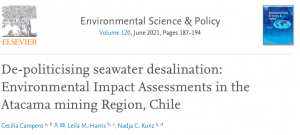
Abstract: The construction of desalination plants is proliferating worldwide. In Chile, seawater purification technologies are framed as a tool for confronting water scarcity, stabilizing water provision and optimizing overall water availability while minimizing impacts on groundwater resources. Yet, local communities hosting desalination facilities in their territories are still confronting ongoing water-related inequities. The aim of this paper is to analyse how Environmental Impact Assessments (EIAs) and Declarations of Environmental Impact (DIAs) fit with the assessment and mitigation of socio-environmental implications of desalination. While they are intended to highlight and minimize negative impacts, and address them as part of the approval process prior to the construction of these facilities, we see instead how they are at times marshalled in ways that enable negative socio-environmental outcomes. Thorough analysis of EIAs (1994–2018) and DIAs (2010–2018) of mining companies in the Atacama region our research revealed shortcomings concerning public participation, mitigation and compensation plans, and water-energy management. This occurs, in part, through the depoliticization (or rendering technical) of desalination, in ways that obscure uneven and negative socio-environmental outcomes.
Campero, C., Harris, L. M., & Kunz, N. C. (2021). De-politicising seawater desalination: Environmental Impact Assessments in the Atacama mining Region, Chile. Environmental Science & Policy, 120, 187-194. https://doi.org/10.1016/j.envsci.2021.03.004
Open access to publication available here.